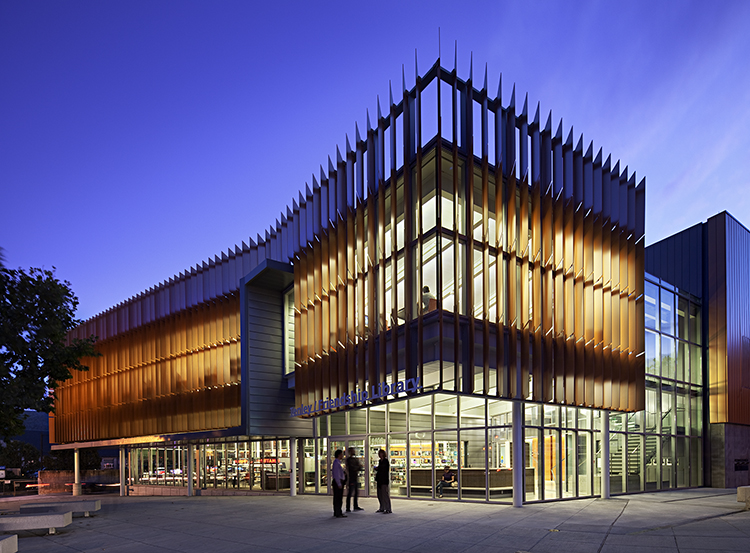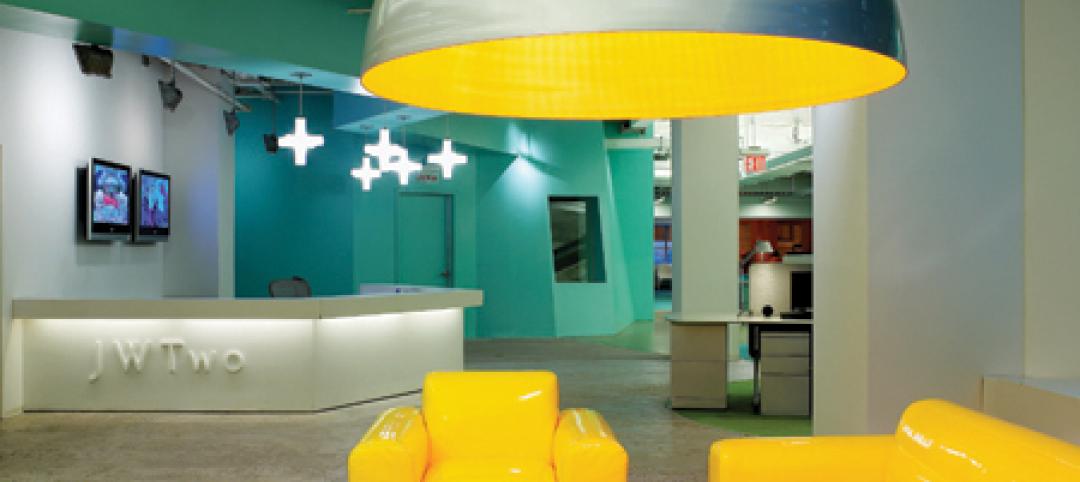Global architecture and design firm Perkins+Will announced today that they have signed an agreement which will result in The Freelon Group joining forces with Perkins+Will.
Founded by Phil Freelon, FAIA, LEED AP in Research Triangle Park, N.C., The Freelon Group is world renowned for design excellence and consulting work with museums, libraries, universities, and other civic and institutional clients.
Perkins+Will offers a full range of architectural expertise from its offices in Charlotte and RTP, notably to healthcare, science and technology, education, corporate, commercial, civic, and cultural clients. These capabilities will be enriched by The Freelon Group’s similar work, expanding the firm’s portfolio in these sectors. The combined practice will have nearly 80 professionals creating one of the largest and most award-winning architecture and design practices in North Carolina.
The Freelon Group will bring a portfolio of design achievements on behalf of some of America’s most respected cultural institutions including the Smithsonian Institution’s National Museum of African American History and Culture in Washington, D.C., the National Center for Civil and Human Rights in Atlanta, the Emancipation Park in Houston, the Museum of the African Diaspora in San Francisco, and multiple projects for the Washington, D.C. Public Libraries.

The Tenley Library, a Washington, D.C. Public Library designed by Freelon. Photo credit: Mark Herboth Photography
“By joining Perkins+Will, we can offer our clients in North Carolina and around the world a full spectrum of services for just about any type of project,” said Freelon. “The firms are ideally matched as we share a dedication to design excellence and commitment to social responsibility.”
Upon completion of the transaction, Freelon will assume a key leadership role at Perkins+Will in both North Carolina and globally. As the Managing and Design Director of the North Carolina practice, he will lead both Perkins+Will North Carolina offices in RTP and Charlotte. Freelon will come to Perkins+Will as an important member of the firmwide leadership team and will join the Board of Directors. He will also be a key leader for the firm's cultural and civic practice.
Freelon founded The Freelon Group in 1990. He is the recipient of the Thomas Jefferson Award for Public Architecture from the American Institute of Architects (AIA) and a member of the AIA College of Fellows.
He was appointed by President Obama to serve on the National Commission of Fine Arts and earned the academic appointment of Professor of Practice at the Massachusetts Institute of Technology (MIT) School of Architecture and Planning, where he will continue to be a member of the faculty.
Freelon has lectured at more than 30 major universities, museums, and other prominent venues, and his work has been published globally. A native of Philadelphia, Freelon earned his Bachelor of Environmental Design in Architecture degree from North Carolina State University and his Master of Architecture degree from MIT. He also received a Loeb Fellowship and spent a year of independent study at the Harvard University Graduate School of Design.
“With Phil Freelon, his experienced team of 40 designers, and other professionals who intend to join Perkins+Will, we look forward to offering clients a deeper level of cultural design expertise,” said Perkins+Will President and Chief Executive Officer Phil Harrison, FAIA, LEED AP. “Phil will further strengthen our leadership team and is a natural complement to the design excellence culture at Perkins+Will.”
Perkins+Will employees in the RTP office intend to relocate to The Freelon Group’s RTP office space. This office will work collaboratively with the Perkins+Will Charlotte office to service clients throughout North Carolina, nationally, and globally. Under Freelon’s direction, current Perkins+Will leadership will continue to serve the North Carolina practice, with David Brownlee in the role of Director of Operations in the RTP office and David Gieser as Director of Operations in the Charlotte office.
Related Stories
| Aug 11, 2010
Florida mixed-use complex includes retail, residential
The $325 million Atlantic Plaza II lifestyle center will be built on 8.5 acres in Delray Beach, Fla. Designed by Vander Ploeg & Associates, Boca Raton, the complex will include six buildings ranging from three to five stories and have 182,000 sf of restaurant and retail space. An additional 106,000 sf of Class A office space and a residential component including 197 apartments, townhouses, ...
| Aug 11, 2010
Restoration gives new life to New Formalism icon
The $30 million upgrade, restoration, and expansion of the Mark Taper Forum in Los Angeles was completed by the team of Rios Clementi Hale Studios (architect), Harley Ellis Devereaux (executive architect/MEP), KPFF (structural engineer), and Taisei Construction (GC). Work on the Welton Becket-designed 1967 complex included an overhaul of the auditorium, lighting, and acoustics.
| Aug 11, 2010
Best AEC Firms to Work For
2006 FreemanWhite Hnedak Bobo Group McCarthy Building Companies, Inc. Shawmut Design and Construction Walter P Moore 2007 Anshen+Allen Arup Bovis Lend Lease Cannon Design Jones Lang LaSalle Perkins+Will SmithGroup SSOE, Inc. Timothy Haahs & Associates, Inc. 2008 Gilbane Building Co. HDR KJWW Engineering Consultants Lord, Aeck & Sargent Mark G.
| Aug 11, 2010
High-Performance Workplaces
Building Teams around the world are finding that the workplace is changing radically, leading owners and tenants to reinvent corporate office buildings to compete more effectively on a global scale. The good news is that this means more renovation and reconstruction work at a time when new construction has stalled to a dribble.
| Aug 11, 2010
Great Solutions: Business Management
22. Commercial Properties Repositioned for University USE Tocci Building Companies is finding success in repositioning commercial properties for university use, and it expects the trend to continue. The firm's Capital Cove project in Providence, R.I., for instance, was originally designed by Elkus Manfredi (with design continued by HDS Architects) to be a mixed-use complex with private, market-...
| Aug 11, 2010
Nurturing the Community
The best seat in the house at the new Seahawks Stadium in Seattle isn't on the 50-yard line. It's in the southeast corner, at the very top of the upper bowl. "From there you have a corner-to-corner view of the field and an inspiring grasp of the surrounding city," says Kelly Kerns, project leader with architect/engineer Ellerbe Becket, Kansas City, Mo.
| Aug 11, 2010
AIA Course: Historic Masonry — Restoration and Renovation
Historic restoration and preservation efforts are accelerating throughout the U.S., thanks in part to available tax credits, awards programs, and green building trends. While these projects entail many different building components and systems, façade restoration—as the public face of these older structures—is a key focus. Earn 1.0 AIA learning unit by taking this free course from Building Design+Construction.
| Aug 11, 2010
BIM adoption tops 80% among the nation's largest AEC firms, according to BD+C's Giants 300 survey
The nation's largest architecture, engineering, and construction companies are on the BIM bandwagon in a big way, according to Building Design+Construction's premier Top 50 BIM Adopters ranking, published as part of the 2009 Giants 300 survey. Of the 320 AEC firms that participated in Giants survey, 83% report having at least one BIM seat license in house, half have more than 30 seats, and near...
| Aug 11, 2010
World's tallest all-wood residential structure opens in London
At nine stories, the Stadthaus apartment complex in East London is the world’s tallest residential structure constructed entirely in timber and one of the tallest all-wood buildings on the planet. The tower’s structural system consists of cross-laminated timber (CLT) panels pieced together to form load-bearing walls and floors. Even the elevator and stair shafts are constructed of prefabricated CLT.
| Aug 11, 2010
Integrated Project Delivery builds a brave, new BIM world
Three-dimensional information, such as that provided by building information modeling, allows all members of the Building Team to visualize the many components of a project and how they work together. BIM and other 3D tools convey the idea and intent of the designer to the entire Building Team and lay the groundwork for integrated project delivery.








